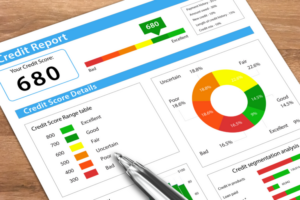 (From the Financial Literacy Blog) – Understanding credit is essential to navigating personal finances and establishing independence. Credit, or the ability to borrow money to access goods or services with the agreement that the borrower will pay it back later, is issued by credit unions, banks, and other lenders to those who want or need to obtain something but either cannot or do not want to pay for it now. However, to maintain a good credit standing, it is crucial to ensure all payments—even minimum balance payments—are made towards the outstanding debt by the due date. Late and/or missed payments can severely impact your overall credit score and subsequently your future creditworthiness—or your ability to obtain more credit for future needs from lenders.
(From the Financial Literacy Blog) – Understanding credit is essential to navigating personal finances and establishing independence. Credit, or the ability to borrow money to access goods or services with the agreement that the borrower will pay it back later, is issued by credit unions, banks, and other lenders to those who want or need to obtain something but either cannot or do not want to pay for it now. However, to maintain a good credit standing, it is crucial to ensure all payments—even minimum balance payments—are made towards the outstanding debt by the due date. Late and/or missed payments can severely impact your overall credit score and subsequently your future creditworthiness—or your ability to obtain more credit for future needs from lenders.
Why Do On-Time Payments Matter?
When it comes to determining a person’s creditworthiness, the biggest factor lenders look at is payment history. Lenders want to be sure the person can and will pay them back entirely and on time. After all, these terms are what both parties agreed to for funding to be lent, so if the terms are not able to be met then the lender will likely say no.
What Happens if You Are Late Making Payments?
You can rest assured knowing that one single missed payment should not ruin your credit score. Lenders look at payment history over a stretch of time, so if they see one missed payment amidst a sea of on-time payments, they are less likely to be concerned. It’s when they see missed payment after missed payment, repeatedly, that they would begin to feel wary and lean towards not approving the credit limit.
It is important to note, however, that if you do have a past due payment on your credit report, you should try to pay it off as quickly as possible. The longer it stays unpaid, or delinquent, the worse it looks on your credit report and the more negative of an impact it can have. Generally, outstanding balances after 30 days for loans and 180 days for a credit card account will be moved to collections.
Accounts in collections are specially noted on credit reports, which has a bigger effect on bringing down the overall credit score. Once a payment account has been moved to collections, it cannot be moved back under the “current” section of a credit report. At this point, the original lender may take legal action against your due to the delinquency and sue you to recover funds lost.
Late, missed, and delinquent payments remain on your credit report for seven years. The unfortunate result of this often includes reduced credit limits on existing credit (and smaller limits for any potential future credit), late fees, and increased interest rates—all of which can become a financial burden.
Tips for Making Payments On-Time
There are a few steps you can take ahead of time to ensure your payments are made by their due date and that you remain in or improve towards good credit standing. First, check to see which payments have an autopay feature. By setting it up so at least the minimum payment goes through for each pay period, it takes away the possibility of forgetting and/or missing the due date altogether. Second, mark payment due dates on a calendar and set up reminders for when they are due; you may even want to consider setting them up as recurring reminders so they alert the user regularly. Lastly, it’s never a bad idea to make payments early and often, as getting ahead helps in case you run into unforeseen financial struggles and/or eases the stress of paying only month-to-month. These extra steps can save a lot of hassle in the long run.
How to Improve a Dropped Credit Score?
Immediate steps that can be taken to help improve your credit score are to review your credit report regularly (and report any errors), avoid applying for new credit, make all future payments on-time, pay down debt, keep credit utilization low, and carefully build a credit file and positive history.
As always, Maine’s credit unions are equipped to assist with any financial needs. Many credit unions have Certified Credit Union Financial Counselors (CCUFCs) on-staff to support anyone looking for guidance regarding their financial situation—including navigating and improving credit and overall creditworthiness.
